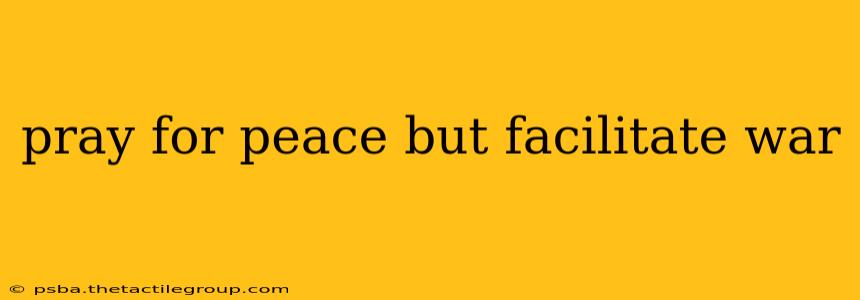The Paradox of Peace: Praying for Tranquility While Enabling Conflict
The phrase "pray for peace but facilitate war" encapsulates a deeply unsettling paradox inherent in human behavior and global politics. It highlights the chasm between idealistic aspirations and the often-brutal realities of power, self-interest, and the complex web of international relations. This essay will explore this contradiction, examining the various ways in which individuals, nations, and institutions might simultaneously advocate for peace while inadvertently, or even deliberately, contributing to conflict.
The Hypocrisy of Peaceful Rhetoric
On the surface, the desire for peace is almost universally lauded. Leaders publicly denounce violence, religious figures preach non-violence, and citizens yearn for a world free from conflict. However, beneath this veneer of peaceful rhetoric, often lie complex motivations and actions that directly contradict these professed ideals. This hypocrisy can manifest in several ways:
-
Economic Interests: The pursuit of economic gain, whether through resource extraction, trade agreements, or military industrial complexes, can drive nations into conflicts that directly undermine the peace they claim to desire. Wars, while devastating, can also be lucrative for certain sectors, creating a perverse incentive to maintain or even exacerbate instability.
-
Political Expediency: Leaders may invoke peace as a rhetorical tool to bolster their domestic popularity or gain international support while simultaneously engaging in actions that fuel conflict. This could involve supplying weapons to warring factions, providing intelligence that benefits one side over another, or employing subtle diplomatic maneuvers to escalate tensions.
-
Ideological Conflicts: Deeply held ideological beliefs, often rooted in religious, ethnic, or nationalist identities, can lead to intractable conflicts that transcend simple geopolitical calculations. While proponents of these ideologies might genuinely believe they are fighting for a just cause, their actions can contribute to widespread violence and suffering.
The Unintended Consequences of Actions
Even when actions are not deliberately designed to facilitate war, unintended consequences can have devastating effects. For example:
-
Arms Sales: The sale of weapons to countries with questionable human rights records or involved in ongoing conflicts can inadvertently prolong or intensify violence. While these sales may be motivated by economic considerations or strategic alliances, the outcome often contradicts the stated commitment to peace.
-
Interventionism: Military interventions, often justified on humanitarian grounds, can destabilize regions and lead to unforeseen consequences, including the escalation of conflict and the rise of extremist groups. The intentions may be noble, but the outcomes can be catastrophic.
-
Sanctions: While sanctions are often presented as a peaceful way to exert pressure on rogue states, they can inflict hardship on ordinary citizens, potentially fueling resentment and increasing the likelihood of conflict.
The Path Towards Genuine Peace
Addressing this paradox requires a fundamental shift in perspective. Genuine peace requires not just pious pronouncements but a commitment to addressing the root causes of conflict. This includes:
-
Promoting Economic Justice: Addressing global inequalities and ensuring fair access to resources can reduce the incentives for conflict driven by economic desperation.
-
Fostering Inclusive Governance: Democratic institutions that guarantee representation for all segments of society can help prevent the rise of extremist ideologies and reduce the risk of civil unrest.
-
Investing in Diplomacy and Conflict Resolution: Prioritizing diplomatic efforts and investing in effective conflict resolution mechanisms are essential for preventing and resolving conflicts peacefully.
Ultimately, the path toward genuine peace is a complex and challenging one. Simply praying for peace is insufficient; it requires a profound commitment to tackling the systemic injustices and power imbalances that fuel conflict. Only then can we hope to bridge the gap between our aspirations for a peaceful world and the often-turbulent reality we inhabit.

